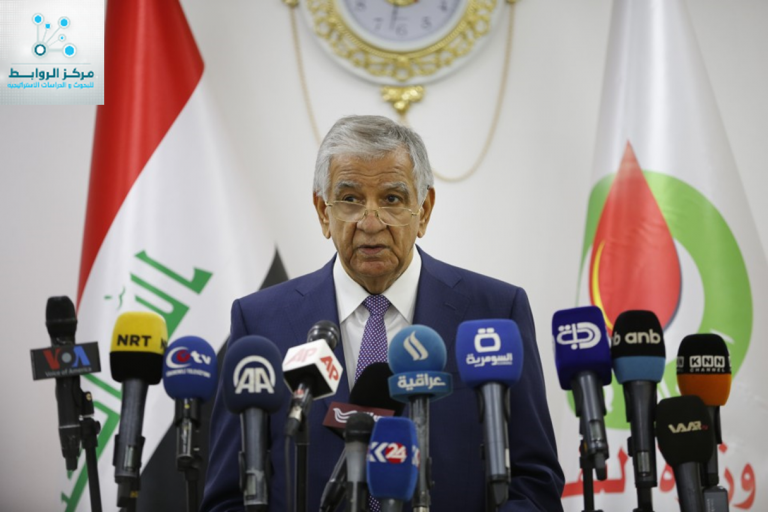Iraqi Prime Minister Haidar al-Abadi has scored many achievements since he assumed the premiership. The most important of which is the liberation of the country from the terrorist organization ISIS , the preservation of the unity of the country and the provision of community and economic security to the citizens and other achievements include the interest in the oil sector in which he seeks to extend a new export line extending from Kirkuk to the port of Ceyhan .
In the same context, Oil Minister Jabbar al-Aluaibi said that the ministry is working to double the production of oil fields in Kirkuk to reach one million barrels per day and increase the volume of Iraqi exports through the Turkish port of Ceyhan without passing the Kurdistan region to get rid of the Kurdish threat of sabotage or control.
Al-Luaibi added that the ministry is working on the construction of a new pipeline with a length of about 250 km to export oil without going through the Kurdistan region.
The pipeline extends from Baiji district to Vishkhabur, an Iraqi town in the northern Iraqi province of Dohuk on the Khabur Tigris River. It is an important international transit point that it lies on the triple border point between Iraq, Syria and Turkey.
A spokesman for the Ministry of Oil Assem Jihad said on November 26, 2017, that “the Minister of Oil instructed the relevant departments in the ministry to provide companies interested in the project with documents of the new pipeline, which is implemented in accordance with the formula of the system of construction and operation and transfer of ownership.
He added that the new pipeline “will transfer crude from the fields of Kirkuk to the Turkish port of Ceyhan,” instead of the old pipe, which was “greatly damaged by the repeated targeting of the pipeline and abuses caused by sabotage operations of the terrorist ISIS that it hinders its rehabilitation.”
Iraq exported from Kirkuk between 250 to 400 thousand barrels per day to Turkey before the export stopped through the old pipeline, which was destroyed after the control of the organization to the areas passing through the north of the country in 2014.
Al-Luaibi added that the difficulties and financial and economic challenges will not prevent his ministry from rehabilitating the pipeline network of oil exports.
He noted that Iraqi forces have recovered all the oil fields in the oil-rich city of Kirkuk and the disputed areas in the Northern provinces controlled by the Kurds in 2014, because of the destruction and destruction left by the attack of the Islamic state organization.
Al-Luaibi pointed out that the federal authorities are unable to export oil through the northern pipelines because of the damage caused by the military operations, and also for its passage through Kurdish territory.
The new line, which will replace the old destroyed one, is the first step since 2014, after the cessation of Baghdad to export oil of the south and central via Turkey due to the damage of oil pipelines by repeated attacks of the organization of Daash, where the Iraqi export through the Turkish gate is limited to Kirkuk oil only with other fields near Erbil, controlled by the Kurdistan Regional Government in the north of the country.
Iraqi oil officials have accused the Kurdish authorities of stopping the export of Kirkuk fields since the Iraqi government seized control in October in response to a referendum on Kurdish secession, which was widely opposed by Turkey, Iran and Western powers because of the region’s failure to respond to the oil ministry’s request to resume exports from Kirkuk.
Jihad added that the part of the old strategic pipeline for the said distance has been greatly affected by the repeated targeting of the pipe and the excesses suffered as a result of sabotage operations of terrorist gangs and this impedes the rehabilitation and re-service, and thus the new pipeline will be a substitute for the previous pipe.
In the same context, an Iraqi official revealed that 35 foreign companies submitted its bids to the Federal Oil Ministry to extend an oil pipeline extending from the fields of Basra province (south) to the Jordanian port of Aqaba.
A member of the parliamentary oil committee Zahir al-Abadi said, ” the Ministry of Oil received bids of 35 companies, regarding the extension of an oil pipeline from Basra to the Jordanian port of Aqaba with a length of about 1700 km,” noting that “the project included a pipeline for the export of oil and next to another pipeline for the export of gas.”
Zaher al-Abbadi pointed out “The Ministry of Oil will study the bids of the companies and choose the best available offers,”
It is worth to be noted that Basra contains the largest oil wells in Iraq, and produces at least 80% of oil, the only maritime port of Iraq to the world, and Iraq exports most of its oil through its ports.
Shatha Khalil *
Economic unity
Rawabet Center for Research and Strategic Studies

